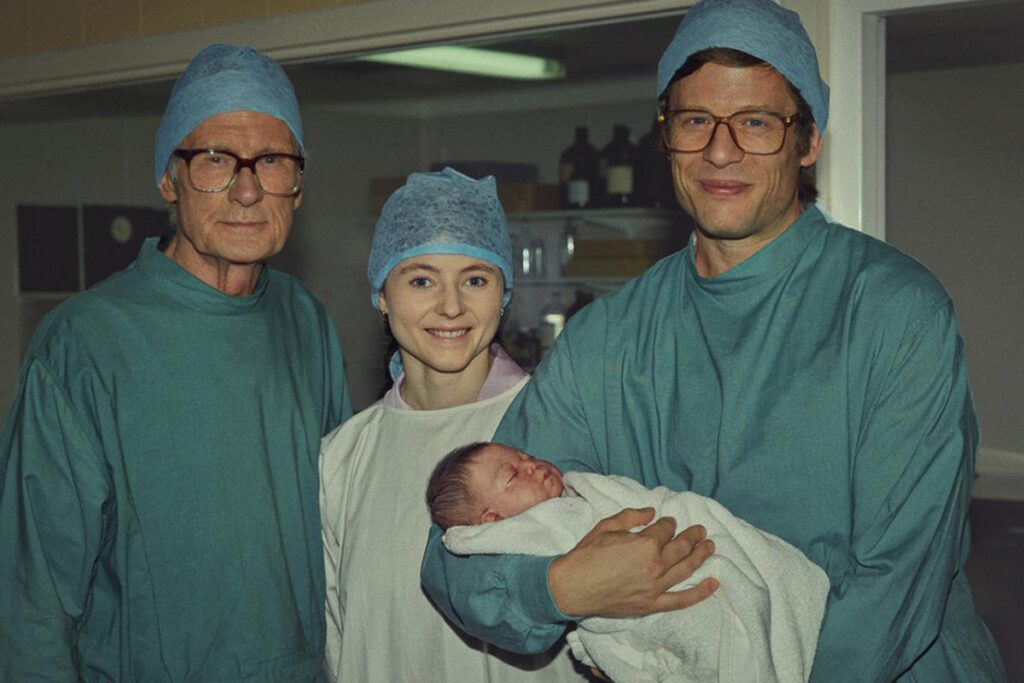Joy (now on Netflix) doesn’t explicitly aim to right a historical blunder, but it ends up doing so anyway. Big picture, it’s the BOATS (Based On A True Story) saga of three scientists who developed in-vitro fertilization, or IVF, the procedure that creates “test tube babies” for would-be parents struggling to conceive. Smaller picture, it’s a tribute to Jean Purdy, a nurse and embryologist who was instrumental in the study that would result in millions of babies being born worldwide. The film doesn’t get into how she and her efforts went unrecognized for decades by the scientific community – sexism and her untimely passing in 1985 likely contributed to that – but simply dramatizing this story from her point of view, and in a modestly reverential manner with the gifted Thomasin McKenzie in the role, will help the world better remember her.
JOY: STREAM IT OR SKIP IT?
The Gist: Cambridge, May, 1968. Jean Purdy (McKenzie) gamely and handily snatches a loose lab mouse, and that’s all it takes to get her a new job. And so she joins physiologist Dr. Robert Edwards (James Norton) in his laboratory, assisting him in a revolutionary endeavor that would allow couples to conceive when all other methods have failed them. “We’re going to cure childlessness,” they declare, and we believe them, possibly because it’s 2025 and upwards of 12 million children have been conceived in the manner I’ll hereby describe in crude everyman terms: Removing the ovum from the mother, encouraging the father’s fresh sperm sample to get on in there, then putting the fertilized egg back in the mother’s uterus. Robert and Jean recruit gifted surgeon and obstetrician Dr. Patrick Steptoe (Bill Nighy) to the cause – he excels at extracting the ovum and reinserting it – and he sets them up in a crummy old beat-up lab space in the basement of his hospital in Oldham so they can get to work.
Easier said than done? Absolutely. This movie wouldn’t be nearly two hours long if it was a snap. It’ll take years, so we’d better get to know these people a little better, especially Jean. She’s youngish, not terribly far removed from university, and single. Her mother, Gladys May (Joanna Scanlan), is alone too. They’re both devout and go to church together regularly and you can see where this is going already, right? The church thinks IVF scientists are “playing God,” and asserts that the only person who should be “playing God” is God. This is a matter of interpretation of course, but vast chunks of society is under the belief that making babies in any way that isn’t the old-fashioned way – you know exactly what way that is, and you better NOT be enjoying it, you heathens! – is wrong wrong wrong. On top of that, Dr. Steptoe performs (gasp) abortions, and isn’t there the risk that “test tube babies” are more susceptible to birth defects? The answer to that is “no,” but the press and conservatives and other loud idiots don’t want to hear or believe that.
This is a long way of saying Gladys May is one of those idiots, and stops speaking to Jean for her ungodly work. Ungodly work that takes literal years to progress, so Jean, on a bit of an island without her mother or beloved church – and herself suffering from severe endometriosis, assuring she’ll never have a child – throws herself into it. There will be montages: of Jean and Steptoe and Edwards peering into microscopes, of fathers lining up and turning in their little warm canisters of bodily extract, of mothers going through a series of painful injections and a variety of ups and downs for the greater good of science and the benefit of many many people just like themselves. Jean bonds with the circle of mothers participating in the trial; Edwards debates yelling morons on television; Steptoe furrows his brow; sometimes, they’re assisted by the no-nonsense Nurse Muriel (Tanya Moodie). They all keep at keepin’ at it, through success and failure and inevitably success, driven towards the goal of giving women two very important things: hope and choice.
What Movies Will It Remind You Of?: The quasi-historical approach, 1960s/’70s setting and women’s-rights themes is similar to Call Jane, about the pre-Roe vs. Wade group of American abortion activists known as the Jane Collective.
Performance Worth Watching: Since her breakout in 2018’s Leave No Trace, McKenzie has stubbornly refused to be not good in a movie. Despite its warmth and general niceness, Joy won’t win her an Oscar, but one does seem inevitable.
Memorable Dialogue: Jean knows where the heart of the issue lies:
Edwards: You’re aware they’ll throw the book at us. The church, the state, the world. We will unite them all against us.
Jean: But we’ll have the mothers.
Sex and Skin: None.
Our Take: Joy is a highly conventional historical-ish drama that works through predictable beats and shamelessly fetishizes analog things that whirr and click and crackle, like turntables and typewriters, to render the period setting nice and tangible. There’s nothing new whatsoever about the way this story is told, but there’s little argument that it’s not worth telling – give Jean Purdy her due, thank you. And the manner in which Ben Taylor directs is perfectly fine, professional and slick, as long as you don’t think too hard about how conservative his approach is to a topic that was revolutionary at the time.
That’s an inconvenient irony, but it’s not hard to overlook it. It’s not hard to watch Joy either, thanks especially to fine and committed performances by the earnestly charismatic McKenzie, a rock-solid Norton and the ever-lovin’ Nighy, who’s either a measure of extreme calm or extreme hysteria in his performances (this film calls for the former, you won’t be surprised to learn). It’s also easy to be persuaded by the understated rah-rah arc of the narrative, which is a less showy version of the ragtag group of misfits fighting the world in order to establish a perfectly ethical and uncontroversial – to those who aren’t so obstinate that they refuse to try to understand the science of it, anyway – procedure as commonplace.
Not a spoiler alert: They succeed! Hooray! The first IVF baby was named Louise Joy Brown, hence the movie title. The saga leading up to the little bundle of joy, condensed and fictionalized as Joy inevitably must be, is plaintive and on-the-nose, but ultimately endearing. It makes you feel good without any guilt. And that’s enough.
Our Call: Joy breaks no boundaries as a historical drama. But as a long-overdue tribute to a woman who should be a household name, it works just fine, and is hard to dislike. STREAM IT.
John Serba is a freelance writer and film critic based in Grand Rapids, Michigan.
Read the full article here








